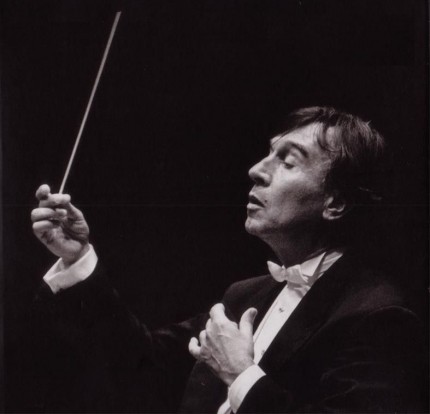Claudio Abbado 1933-2014
Claudio Abbado, who formed a memorable podium tandem with Sir Georg Solti as the Chicago Symphony Orchestra’s principal guest conductor in the 1980s died Monday at his home in Bologna, age 80.
“I am deeply saddened by the loss of a great musician, a man who for many decades has marked history in the world of conducting and musical interpretation for international institutions,” said Riccardo Muti, CSO music director, in a statement released by the orchestra. “His work is an immense testimony to the importance of European and Italian culture around the world. I admire him for the strong courage he showed in the face of a long and terrible illness, and for the seriousness and profundity that characterized his life as a musician and as a Maestro.”
Abbado enjoyed many triumphs during his high-profile international career, including, most famously, his succeeding Herbert van Karajan as music director of the Berlin Philharmonic Orchestra. Abbado led the storied German ensemble from 1989-2002.
The celebrated Italian conductor enjoyed relationships with most of the world’s leading orchestras and opera houses. Abbado was music director of La Scala for nearly two decades (1968-86). He spent much time working with young musicians in such ensembles as the European Community Youth Orchestra, which he founded, and its later adult offshoot, the Chamber Orchestra of Europe, later doing the same with the Gustav Mahler Youth Orchestra and Mahler Chamber Orchestra.
While his U.S. appearances were fiftul and almost nonexistent in his late, post-Berlin years, Abbado will be remembered with great fondness by CSO audiences.
One fascinating aspect of the Solti/CSO era was that his repertory and Abbado’s were quite similar—apart from the younger Italian’s fondness for pointed modernist works, like Stockhausen’s Gruppen (memorably paired with Rachmaninoff’s Second Piano Concerto with Cecile Licad, which yielded a superb CSO recordng).
Like Solti, Abbado’s orchestral repertory was centered on the Austro-German core repertory: Mozart, Schubert, Beethoven, Brahms and, especially, Mahler. This was a rich time for CSO audiences, when one could hear a Mahler symphony performed by Solti one season and the same work by Abbado the next, in often quite different interpretations yet equally successful results.
Where Solti favored bold projection, rhythmic tension and brisk tempos, Abbado provided an ideal counterpoise—warmer, more organic and moulded yet no less exciting.
Coming of age as a young concertgoer long before I wrote about music for a living, I heard many memorable Abbado performances with the CSO, including a riveting Shostakovich Violin Concerto with Viktoria Mullova, and an extraordinary Mahler Seventh. Abbado brought a warmth and cohesion to this famously intractable work that has never been equalled, and the DG recording from these concerts remains among the CSO’s finest recorded treasures.
In a profession filled with titanic egos and ruthless ambition, Abbado was a quiet, private man of great humility. Despite leading some of the world’s most high-profile music institutions, he eschewed the limelight and appeared uncomfortable and ill at ease with his celebrity status offstage. Even as cancer transformed his handsome Mediterranean looks to a withered and emaciated state, he bore his illness with great dignity and continued to work until his death.
For many CSO members, concertgoers and observers it was Claudio Abbado who should have succeeded Solti as music director rather than Daniel Barenboim. An Abbado era at the CSO will have to remain one of the great what if’s of Chicago musical history.
Fortunately we have his many recordings as a legacy and, especially, the cherished memories for all who experienced Claudio Abbado’s rich, intelligent and humane performances.
